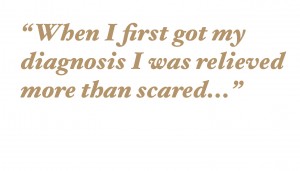Rachel
 Rachel cried constantly. She thought it was normal—that everyone had the feelings of despair that lingered in her mind.
Rachel cried constantly. She thought it was normal—that everyone had the feelings of despair that lingered in her mind.
She wrote poetry and kept a journal in middle school, writing in it every day. When she was a little older she started reading it back, reliving the sadness. “It was just really heartbreaking to read because I never even remember being that depressed all the time. I didn’t think there was anything wrong with me.”
 Her first poem, written at twelve years old, titled “Lonely,” speaks in a young girl’s prose of un-requited friendships, trying to fit in, feeling torn apart on the inside and thinking it would be better “if I wasn’t ever born.” In a later entry she said she wished she could wake herself up “but I can’t because that horrible bad dream—that’s called life!”
Her first poem, written at twelve years old, titled “Lonely,” speaks in a young girl’s prose of un-requited friendships, trying to fit in, feeling torn apart on the inside and thinking it would be better “if I wasn’t ever born.” In a later entry she said she wished she could wake herself up “but I can’t because that horrible bad dream—that’s called life!”
She finally realized the dark, consuming thoughts that overwhelmed her weren’t shared by everyone, when a high school friend asked her why she was crying all the time.
“I really didn’t have a reason, I was just upset and I felt like crying. So that’s what I told them and they said: ‘You know Rachel, it’s not normal for people to want to cry all the time and feel as sad as you do.’” On her friend’s advice she confided in her mother and sought professional help.
 Diagnosed with depression at 17, Rachel was finally able to understand the provenance of her dark moods. “When I first got the diagnosis I was relieved more than scared because I finally realized that I was normal and a lot of people have this problem and I wasn’t some strange weirdo always sad all the time. There are other people dealing with the same issues I was.”
Diagnosed with depression at 17, Rachel was finally able to understand the provenance of her dark moods. “When I first got the diagnosis I was relieved more than scared because I finally realized that I was normal and a lot of people have this problem and I wasn’t some strange weirdo always sad all the time. There are other people dealing with the same issues I was.”
A history of mental illness lurked throughout her family tree. Her father was depressed, as was his mother, and an uncle had been diagnosed with schizophrenia. “So, I mean it’s everywhere in my family,” she said, “so I’m doomed to have something.”
A setback came soon after she began treatment, when her father suddenly died. The anti-depressant medications were making her tired but now she would wake up in the morning and, she said, “I felt like I had just run ten miles and got hit by a bus.” After school she would go home, be in bed by seven o’clock, sleep through the night and wake up, still exhausted.
The first weeks after her father’s death, Rachel’s friends rallied around her, but as her depression swelled, they went on with their lives, leaving Rachel feeling lost. She began forcing them out of her life, amplifying her loneliness. Every day things would remind her of her father and send her deeper into despondency. When she most needed her friends, she realized she had pushed them all away. “I felt really alone and I just felt sad. Sad and empty is how I could describe it.”
A combination of psychotherapy with the addition of a stimulant to her medications has helped her manage the dark moods that once controlled her and she is now pursuing a photography degree to fulfill her artistic goals.
“I’ve learned so much about myself and how I react to things, why I react to them, what decisions I make for what reasons—why I am the way that I am,” she said, reflecting on the therapy that has allowed her insights into the genetic roots of her illness.
 “I feel like in my life, I will probably always be dealing with some kind of depression, whether it’s really bad or kind of minor. I think it’s part of who I am and it’s in my genetic makeup. But I’m really hoping that after all of this that I’ve done to try and help that I can make it where I don’t have to suffer with it,” Rachel said, accepting her condition but unwilling to be controlled by it.
“I feel like in my life, I will probably always be dealing with some kind of depression, whether it’s really bad or kind of minor. I think it’s part of who I am and it’s in my genetic makeup. But I’m really hoping that after all of this that I’ve done to try and help that I can make it where I don’t have to suffer with it,” Rachel said, accepting her condition but unwilling to be controlled by it.
In offering advice to others, she emphasized that they are not alone: “There are so many people that go through this and have these hard times and think that something is wrong with them, there are so many people you can relate to. But definitely,” she implored, “get help as soon as possible, go talk to somebody, go to your parents or your guardian or a doctor and just say I think there’s a problem, because I promise, that will be the best thing that you ever do!”
Rachel, you are a beautiful person inside and out. You are an inspiration to others, and your openness will help countless people. You may never know the lives you will touch in a positive way. I am so proud of you!
Rachel, you are an overcomer. I am proud of you for persevering and sharing your story to help others. You have learned to dance in the rain and you are now a ray of hope to many others. You are beautiful!
Rachel, you have a unique and amazing way of viewing life and all that is around you. You have always been strong and adventurous. I am awed by you . Your beauty shines through from deep inside you. Your courage is inspirational.
Rachel, I am so proud of you for coming forth with your story. It takes true courage and shows how strong and brave you really are though you may not think you are. You will inspire and help others who are struggling and I applaud you and love you.
I really admire your courage and clarity of thought on depression. A lot of the time, depression can erode away at people’s sense of what it is to really live. You are strong, and you are a survivor. I respect you.
You have no idea how much you have helped me, i am just sad for no reason at all, all the time, i have even has suicidal thoughts.. but you have inspired me to talk to a friend.. who helped me talk to my parents, and i am now receiving help.. you saved my life, a true inspiration.
Thank you all so much for your support and kind words. They mean so much more to me you will ever know!
Lindsay, I’m so glad my story helped you. That’s exactly why I wanted to share my story, to let others know that they are NOT alone. Keep your chin up and stay strong!!
Rachel, this story brought tears to my eyes. I just got diagnosed a month ago and it’s been such a struggle. I’ve pushed my friends away, and I feel exactly like you did. It’s good to know that there is a light at the end of the tunnel. It felt impossible to be “normal” but, as I’m getting treatment life is starting to get easier. Thank you for sharing!